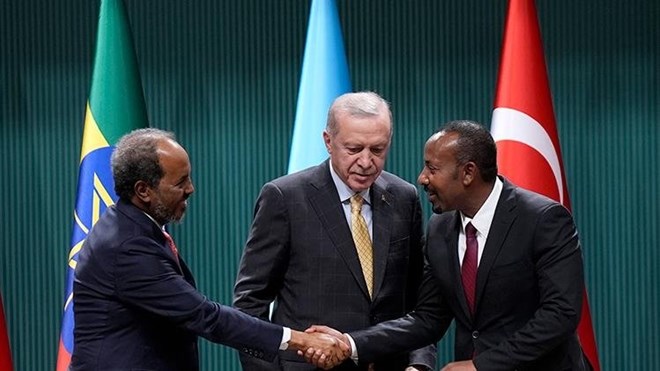Friday December 13, 2024

Somali President Hassan Sheik shakes hands with Ethiopian PM Abiy Ahmed after the agreement (Photo : SONNA)
The relationship between Somalia and Ethiopia, two neighbouring countries in the Horn of Africa, has long been shaped by both tension and opportunity. Recently, much of the discussion has centred on Ethiopia’s pressing need for access to Somali seaports, such as Berbera, to facilitate its growing trade ambitions. While this need is crucial for Ethiopia’s economy, a narrow focus on port access risks overshadowing other critical opportunities for mutual benefit. For Somalia, this moment presents a chance to address its own pressing national priorities while creating a balanced framework for collaboration.
Ethiopia’s Port Access: More Than a Convenience
Ethiopia’s reliance on maritime trade for importing essential goods and exporting products like coffee, sesame, and livestock underscores its dependence on ports. Currently reliant on Djibouti, Ethiopia faces high transportation costs and logistical risks from overdependence on a single trade hub. Access to Somali ports would diversify its routes, reduce expenses, and boost regional trade volumes. For Somalia, granting Ethiopia access is an opportunity to generate significant revenues, attract investment to Somali ports and coastal cities, and create local jobs.
However, such benefits and much more can materialize if the discussions extend beyond Ethiopia’s needs and integrate Somalia’s own interests and development goals.
Somalia’s Priorities in Collaboration
Somalia has much to gain from a well-negotiated partnership but must ensure its sovereignty, resources, and priorities are safeguarded. To do so, Somali leaders should focus on the following key areas:
1. Sovereignty, Unity, and Regional Stability
Ethiopia’s involvement in Somali infrastructure must respect Somalia’s territorial integrity and political cohesion. Agreements must be made transparently through the Federal Government, avoiding arrangements that favour one regional state over another or bypass national authority.
A strong economic partnership can also stabilize border regions often plagued by insecurity and extremist activities. Investments in job creation, infrastructure, and cross-border trade can reduce the influence of groups like Al-Shabaab, fostering long-term peace and economic interdependence.
2. Water Resource Management
The Shabelle and Jubba rivers, which originate in Ethiopia, are lifelines for Somalia’s agriculture and pastoral livelihoods. However, Ethiopia’s irrigation projects and dam constructions upstream pose risks to water availability downstream.
Somalia must secure its water rights through a co-management framework that ensures fair and equitable usage of these shared rivers. By engaging international experts, Somalia can develop agreements that sustain water flow, support agricultural productivity, and prevent resource conflicts.
Improved water management will allow Somalia to increase food security, sustain rural livelihoods, and protect the environment, ensuring long-term resilience for its communities.
3. Energy as a Trade Opportunity
Ethiopia’s renewable energy surplus, particularly its hydropower, presents an opportunity for Somalia to address its chronic energy shortages. Somalia should negotiate agreements to import affordable electricity to power border towns and industrial zones, creating new economic opportunities.
In addition to benefiting Somali households and businesses, such energy agreements can serve as a model for future cross-border energy trade. By co-investing in transmission infrastructure, Somalia can develop its capacity to eventually export renewable energy produced domestically.
This collaboration not only improves Somalia’s energy security but also positions the country as an active participant in regional energy trade, fostering mutual economic growth.
4. Trade and Infrastructure Development
While Ethiopia seeks Somali ports to facilitate its exports and imports, Somalia has much to gain from enhanced cross-border trade. Formalizing the exchange of goods, including livestock, fishery, agricultural produce, and manufactured products, can strengthen local economies and create new markets for Somali businesses.
Infrastructure projects, such as roads and trade corridors linking Ethiopian markets to Somali ports, should prioritize Somali development. Investments in these projects must include job creation, equitable revenue sharing, and efforts to connect isolated Somali regions to domestic and global markets.
Somalia’s Role in Shaping the Future
Somalia must approach these negotiations with a clear agenda that prioritizes its national interests alongside Ethiopia’s port access needs. Key considerations include:
• Water Rights: Secure agreements that guarantee Somalia’s equitable access to shared rivers, ensuring sustainable use for agriculture and livelihoods.
• Energy Partnerships: Negotiate fair pricing and co-investment in energy infrastructure to import Ethiopian electricity and expand Somalia’s trade potential in the energy sector.
• Integrated Development: Promote infrastructure projects and trade agreements that boost Somalia’s economy, create jobs, and foster regional stability.
A Transformative Opportunity
The Somalia-Ethiopia discussion has the potential to go far beyond access to ports. By addressing water management, energy collaboration, trade, and infrastructure, both nations can create a partnership that delivers mutual benefits while promoting regional prosperity.
This is not just about economic gains for Ethiopia or Somalia—it is a chance to ensure Somalia’s priorities are also met, its sovereignty is respected, and its resources are managed sustainably. By seizing this opportunity, Somalia can lay the foundation for lasting progress in the Horn of Africa.
Ahmed A. Hussein, Consultant in New Business Development for value-added food processing and marketing. He can be reached at [email protected]